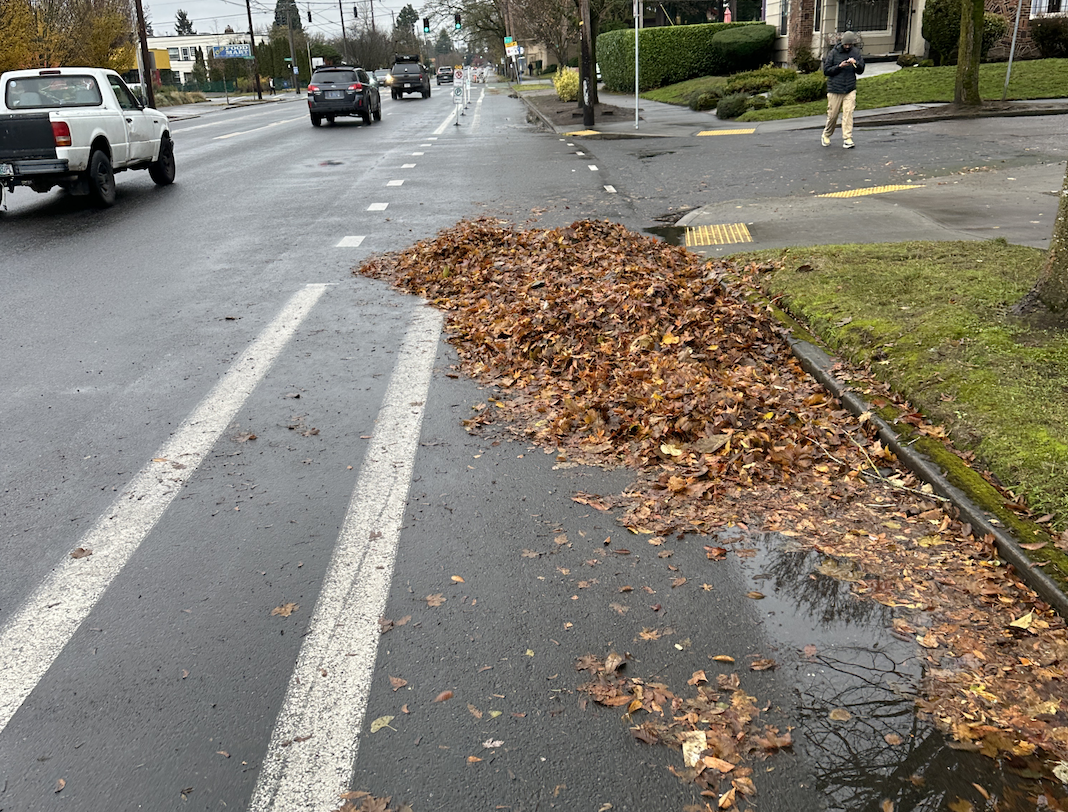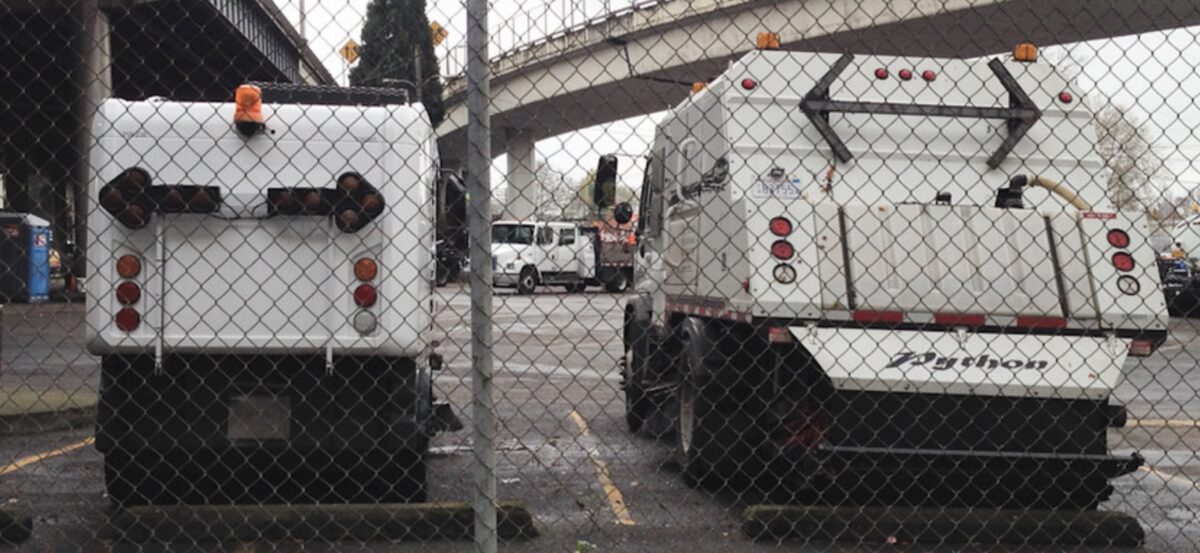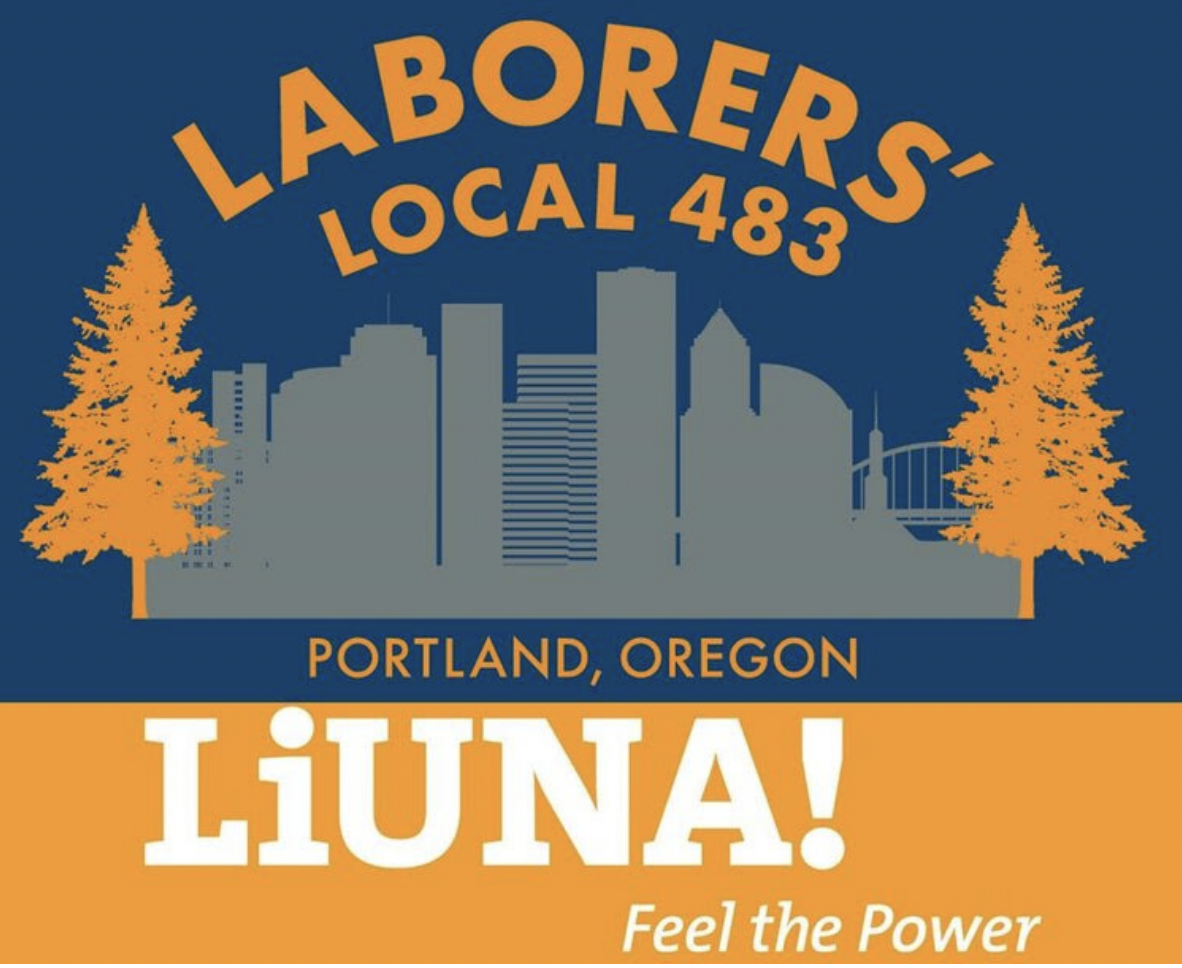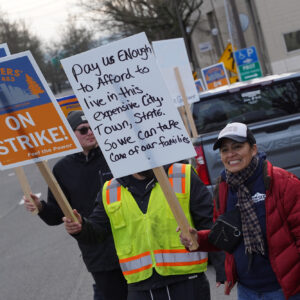“Unless there is a really dramatic change…a strike is very likely.”
-James O’Laughlen, Laborers’ Local 483
A few months ago, some Portland Bureau of Transportation maintenance staffers made their grievances with the city public, sounding the alarm on a crisis that had been simmering for years.
“Many of my coworkers and myself work 70 to 80 hours a week during weather emergencies,” PBOT traffic crew leader Andrew Sterling testified at a September Portland City Council meeting. “Then we have to pick up where we left off for maintenance operations.”
Sterling is the Vice President of Laborers Local 483, the union that represents PBOT maintenance workers. The union had already been running into trouble negotiating a new Portland City Laborers’ (PCL) contract with the city back in September, and frustrations were brewing. Now, almost three months later, the situation still hasn’t improved — and may be coming to a breaking point.
State of the union

If city maintenance problems were evident in the early autumn when Sterling gave his testimony, they’re glaringly obvious now that winter has come. From bikeways covered in drain-clogging leaves that create huge lakes of rainwater to streets coated in slippery, dangerous ice to broken shards of glass filling up the new Division St bike lanes, hazards abound.
Portlanders aren’t staying silent about their frustrations with the status of our streets. It seems like every day that social media is abuzz with people citing their concerns about the state of Portland’s streets — especially the ones designated for people biking and using active transportation. Earlier this week, bike advocate Cathy Tuttle tweeted a video that showcased the dire state of the new protected Broadway bike lanes downtown (the next day, it was cleared). In some cases, people are deciding to take matters into their own hands, taking to the bikeways with rakes and leaving with bags of debris.
Advocates don’t mind doing a bit of volunteer grunt work. But it seems as if these maintenance duties have fallen on the shoulders of individuals just trying to use bike lanes as intended. What’s going on here?
PBOT points to the ever-expanding, $4.4 billion maintenance backlog which the transportation bureau simply doesn’t have the budget capacity to handle right now. But Local 483 union representatives say a lot of it has to do with the way maintenance staffers are treated. Department morale is subzero and getting worse.
“People are overtaxed and burnt out, and it’s been that way for years,” James O’Laughlen, Field Representative & Organizer for Local 483, told me in a phone call earlier this week.
When I talked to O’Laughlen in September, his message was much the same. Now, he says the fact that tension between the union and the City of Portland has only grown stronger in the last three months is cause for real alarm.
The PCL bargaining team lists their goals for the new contract as follows:
● Generous across-the-board pay raises that honor our members’ sacrifices and keep up with the rising cost of living
● Targeted class wage Increases to retain and recruit in demand workers whose positions are understaffed and underpaid.
● Equitable and Enforceable Contract Language that will hold the city to their word and force them to live their stated principles.
● Improved Safety with more resources and new policies that keep our members safe while they serve the city through crisis after crisis
According to O’Laughlen, the city isn’t being upfront with the financial package they’re willing to offer. The PCL bargaining team is asking for 10% wage increases for all maintenance division staff, which includes cost-of-living adjustments (COLAs) appropriate for the dramatic inflation we’ve seen since the last time the union updated their contract.
“They’ve left us in limbo,” O’Laughlen said.
O’Laughlen said he thinks there could be several reasons why city negotiators haven’t tried harder to meet PCL requests.
“They’re either playing some kind of game and thinking they can benefit from it in negotiations, or they just don’t prioritize this kind of work over other things on their plate,” he said. “It’s the same disregard and disrespect for our members and what they’ve been doing.”
As of November, there were dozens of staff vacancies within the maintenance division. Most notably, there were 36 vacancies in the Utility Worker II position, which O’Laughlen described as the “backbone position of PBOT,” who work on everything from the emergency crews to street repair to sewer cleaning.
As you can imagine, all of these vacancies are spreading workers thin — and are a major reason why our streets are in the shape they’re in.
“We’re stuck in a loop of crisis, which is a bad way to do anything — but particularly city infrastructure,” O’Laughlen told me. “We need to have a routinized process that stays ahead of the schedule instead of falling behind.”
What a strike would look like
The next bargaining session the PCL team has scheduled with the City is on December 20th. O’Laughlen said they’re not optimistic.
“Unless there is a really dramatic change in what they’re willing to offer and how they’re willing to engage in the conversation…a strike is very likely,” he said.
A maintenance staff strike could occur as soon as February. O’Laughlen said that if you thought things were bad now, just you wait. A strike would mean no employees to clear out sewers, sweep the streets, clear ice and more. People would notice the effect immediately, and it would also hinder the city’s ability to get larger projects done even after things have cooled down.
As far as the more than $4 billion backlog is concerned, O’Laughlen said it’s no excuse for abandoning the needs of frontline staff.
“The resources for what we’re asking are absolutely there. We’re the fundamental foundation that you have to built upon for those other aspects of the work,” he said. “If our workers aren’t there with sufficient numbers and sufficient talent, nothing gets accomplished. These are the bills you have to pay in order to get to anything else.”
However, O’Laughlen is hopeful that change within the city government will help with the crisis in the long-term.
“Ideally charter reform leads to more ownership of the issues we’re facing so it doesn’t fall just on one commissioner,” O’Laughlen said. (Former PBOT Commissioner Jo Ann Hardesty indicated a similar line of thinking during her meeting with the Bicycle Advisory Committee earlier this week.)
In the meantime, O’Laughlen said employees have to advocate for themselves and the integrity of the city. It hasn’t been easy.
“Our folks are civil servants. The pride they take in providing these services to the city is a major part of why they do what they do,” O’Laughlen told me. “We hoped that bargaining would restore that pride. But it’s been the opposite.”









Thanks for reading.
BikePortland has served this community with independent community journalism since 2005. We rely on subscriptions from readers like you to survive. Your financial support is vital in keeping this valuable resource alive and well.
Please subscribe today to strengthen and expand our work.
While Maintenance is housed under PBOT, about half their funding comes from BES; Water and Parks have their own crews.
Maybe the city ought to move Maintenance out of PBOT and into BES, and have the water & sewer rates pay for street cleaning instead?
The Maintenance Bureau is actually a separate entity from PBOT AFAICT.
I would actually be surprised if they also worked for BES, since BES is a so called ‘enterprise’ bureau and rate payer revenues fund their activities; unlike PBOT, which is reliant on fuel tax and general funds.
BES is PBOT’s biggest funder, accounting for over 30% of its overall funding, mostly operations but some capital as well. Like PBOT, BES gets huge grants from the feds too.
PBOT Maintenance is very much a division of PBOT, since 1988. https://www.portland.gov/transportation/maintenance
Sigh, Portland’s reputation as a “progressive” place is (in my opinion) entirely unearned. Our public agencies have a reputation for treating their unionized workers with contempt and it’s no surprise that a strike is looming here. We (as a city) absolutely have the money to pay our maintenance workers more than a pittance, and it’s shameful that it’s come to this.
Maybe the mayor using the transportation bureau as a place to put councillors he doesn’t like wasn’t a great idea for the city after all!
Portland was a more progressive place than it appears to be now. Its reputation was earned long before I moved here.
“Portland’s reputation as a “progressive” place is (in my opinion) entirely unearned.”
An argument between a union and management is about as universal as it comes. In Europe, (everything’s better in Europe, right?), strikes happen with considerable regularity. Maybe our current level of dysfunction is a sign that our government is becoming more progressive.
I dunno about this one boss. Maybe our current level of dysfunction is a sign of out of touch councilors who serve on the whims of the PBA. In any case, it’s clearly not just “progressive is when the government doesn’t work because of strikes”.
Arguments between labor and management are universal – but Portland public agencies (TriMet in particular) are seemingly always pointing the finger at their unionized employees as to why they have budget shortfalls, or why things aren’t getting done, or whatever it is. PBOT blindly pointing at the “maintenance backlog” as a reason for not being able to properly compensate their workers is both stupid and serves to rouse anti worker sentiment.
People have been accusing city council of kowtowing to the PBA forever, nothing new there.
When you count everything, it is not clear to me that PBOT employees are improperly compensated. Do you have any reason to make that claim besides that’s what they’re saying during a contract negotiation? I mean, why would you believe the statements either party makes under the circumstances? Of course the city is pleading poverty and the union is pleading overwork — that’s how the game is played.
If the “progressive” move is to give the union everything it’s asking for, well… that’s just not very smart.
Why are there vacancies?
There’s vacancies everywhere.
This is a VERY important discussion to have AND a perfect time to evaluate and potentially pivot on what level of street operations – during a storm – is absolutely necessary for public streets in 2023 vs ‘1980s’ standards. Do the majority of arterials [minus emergency routes] in the PNW need to be plowed and gritted or can a there be a period of pause…for it to melt, especially given our new remote work option for many? This may allow staff resources to be applied to prestorm deicing and more critical areas – clearing like facility ADA access – AND save OT costs (and lower mental health stress).
PS. The whole collective (city + property owners + landscapers) mismanagement of leaves each fall is like ‘shooting’ ourselves in the foot, as we know its going to rain and then flood the intersections with plugged catch basins. This annual ‘self inflicted’ emergency – a groundhog day of sorts – also wastes budgetary resources. Needs to be included in any effective labour and budget assessment.
In a word: no. Remember the snow storm that caused a Beaverton school bus to take five hours to drop off school kids? No politician can risk school kids. They are what drive the plowing and sanding schedule, not we coddled remote workers.
Fred, true dat in the before times. But I am asking the collective question so that it can be discussed in a community and way before the news crews are called for the ‘sexy’ weather crisis reporting…say in June. Especially that the DOEs have more experience and resources with remote learning.
The case could be made that no school should be in session now that remote learning is safer than roadway travel during winter storms. [Childcare + free lunch resource needs would also have to be addressed in advance.]
PBOT should lay off most of its executive team and all the useless bloat middle management that exists solely to go to meetings. Use that money to pay workers who provide value more and hire more of them.
I support these city workers and their right to strike, but it’s really hard to feel any sense of urgency around a service I almost *never* see in my part of the city (SW Portland). I wish the workers all the best, but it’s hard to miss services when you’ve never had them.
I wish them the best on their negotiations, but if it comes to it I wholeheartedly support their going on strike. And keep in mind, a strike is meant to be painful, so if they’re on strike and I start noticing maintenance that isn’t getting done especially if it impacts me, that is the city’s doing, not these workers going on strike. The people who refuse to give the workers what they’re asking (very reasonable stuff) are to blame for any strike and its consequences.
Do you mean like the Portland voters who keep refusing to raise the necessary taxes and revenue to provide the infrastructure and services that the community keeps demanding? Do you mean them? And are you one of those voters, or are you somebody else?
Average Oregonians are already way overtaxed, so if they want to raise more revenue they should be looking at corporations, Washington residents who work in Oregon and others who aren’t paying their fair share.
Also, there seems to be a real issue with fiscal responsibility at the city, they keep asking for more money, continue to mismanage it when they get it and then they ask for more. This cycle has got to stop!
“average” is a code for the upper class, who like the corporations they invest in/own, are not taxed any where near enough.
No, it’s not.
Please stop being such a martyr for the so-called ‘underclasses’. Your view of what qualifies as average is so skewed it’s pathetic.
You’ve got a roof over your head, a job, a ride, and opportunities for advancement, so what’s your problem?
The ‘average’ household income in Portland is $100,400 (2020 ACS).
If the so called ‘average’ classes and the rich in Portland were taxed equitably, many children, disabled people, and seniors in the “so called ‘underclasses’ would not lack housing, nutrition, and medical/dental care.
A family earning $100,000/yr pays approximately 32% income tax* to the feds and state. What rate do you feel would be more equitable?
what mechanism would you see using to ensure those funds are actually used to provide housing, nutrition, and medical/dental care?
My wife and I make a bit over 100k combined. Are you saying we’re upper class??
Yes, he is.
Once the top two quintiles aren’t paying 85% of the tax revenues in OR I will believe this…
How about both in a sharply progressive manner. After all, many people in the top two quintiles consider themselves ‘average’ or ‘middle class’.
It’s interesting that everyone commented on income taxes when my particular interest is in progressive taxation of equity*, assets*, capital gains* as well as increased excise and transaction taxes. The ‘average’ class and the rich decrease their tax burden by making use a wide array of tax avoidance strategies targeted towards the wealth, assets, property, and investments that the upper quintiles accumulate.
*including 401ks, IRAs, 403bs, 401as, and 457bs.
The more you continue to target the middle class with your inequity rants the less and less relevant your position is, along with fewer and fewer people agreeing with you. Congratulations on shooting yourself in the foot.
Soren, here’s another tax avoidance scheme by the rich, but rare in Oregon, involving sales tax. Many rich set up tiny corporations (usually either S-corps or 501c3 personal foundations), then use purchase orders to buy all their tangible goods (often at Costco), claiming (usually falsely) that the purchases are for their corporation and not for their personal or household consumption. As long as the purchase is company to company, there’s no sales tax charged nor collected.
Portland voters have done nothing but raise taxes. The problem is most of the recently added taxes are mismanaged and ineffective. Look no further than the failed Homeless Services Tax, the Portland Clean Energy Fund and the Preschool Tax. The issue is only a small % of the population pay for these taxes and therefore people vote in favor of poorly thought out tax plans (not caring since they aren’t paying for it).
Don’t forget the bicycle tax!
A victory for one is a victory for all!
to get this discussion back on track, why are those two street sweepers sitting idle in the yard during daylight hours? They should be routinely out on the street, every day possible.
The article cited staff vacancies.
It’s more than that, they are simply not prioritizing street cleaning.
I don’t think they ever have. It’s not a staffing issue.